BOOKCENTRIC READING CHALLENGE: Readers review nautical books

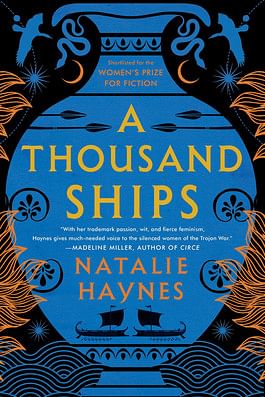
A THOUSAND SHIPS by Nathalie Haynes
(Harper, 2019)
Reviewed by Tasneem Tambawala
Most people are quite familiar with the Trojan War in which Paris, a prince of Troy, eloped with Helen, the beautiful queen and wife of Menelaus, of Mycenae. Most people know how, after 10 long years, the Greeks, led by Agememnon, finally won the war using the Trojan Horse as a trick. Whether it was Achilles (I cannot picture anyone else but Brad Pitt), the indomitable and fierce warrior, who finally met his end in Troy, or Odysseus and his shrewd ways, glory has been theirs over the ages. This book, though, is more about what most of the popular stories of the war don't tell us.
Do you know what made Paris visit Helen? Do you know what happened to Hecabe, her daughters Cassandra and Polyxena, and her daughters-in-law Andromache and Helen, after the war? Do you know what Penelope went through while she waited for Odysseus in Ithaca, for 20 years—10 years of the war and 10 years of his wandering the seas? Do you know about Penthesilea and Hippolyta, the brave Amazon warriors? Do you know who Iphigenia was, and how Agamemnon would have never set sail for Troy but for her? Do you know who Briseis and Chryseis were? Do you know Paris' wife, who he married before he ran off to get Helen?
Natalie Haynes is all of these women, and answers all these questions and more, in A Thousand Ships. This book looks at the Trojan War in a completely different light with respect to the fate of the women it affected. It shifts the focus from the "heroes" and presents them merely as men, while giving space to the untold narratives and perspectives of the women. It brings to the fore a reality that we tend to miss oftentimes. Although from time immemorial, the world has believed that men mostly call the shots, it can be said that many a times these men are influenced by the women in their lives, and tend to think they've had their way, while it's quite often not the case.
As you might be able to tell, I really enjoyed reading this book and would definitely recommend it. I finished it in just a couple of days and found myself thinking about the characters even while I wasn't reading it.
However, I felt that the writing was more journalistic, in the sense that the characters seemed only to be narrating events, and giving lots of information, so there was very little opportunity to understand them and gauge what they were really like. Their feelings, actions and reactions were mostly circumstantial, while I yearned to get to know them better. Despite this, it is a book I would really want everyone to read.
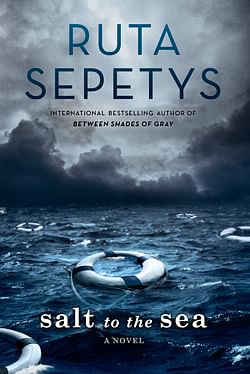
SALT TO THE SEA by Ruta Sepetys
(Philomel Books, 2016)
Reviewed by Humaira Mahee
In 1945, World War II is drawing to a close in East Prussia, and thousands of refugees are on a desperate trek toward freedom, almost all of them with something to hide. Among them are Joana, Emilia, Florian, and Alfred, whose paths converge en route to the ship: the Wilhelm Gustloff. The teenagers are desperate to reach western Germany and board a refugee ship that promises to take them away from their blighted, crumbling homeland. Along the way the three meet new friends, face old enemies and wrestle with the stark desperation of war. Forced by circumstance to unite, the four find their strength, courage, and trust in each other tested with each step closer toward safety. Just when it seems freedom is within their grasp, tragedy strikes. Not country, nor culture, nor status matter as all 10,000 people aboard must fight for the same thing: survival.
This book was inspired by the the worst maritime disaster in history—the sinking of the Nazi ship, the MV Wilhelm Gustloff, an incident that most of us have never heard of it, myself included. It is told from four points of view to allow the reader to spin around the story from all angles. The reader connects the story line together as the protagonists reveal more about themselves, as their fear over their situation grows. I loved how the author recreated the time period so brilliantly. The chapters are very short and there are no unnecessary details. Harrowing stories and heartwarming characters. Reading this book was a whirlwind of emotions.
I am so happy that this book has made its way onto TIME Magazine's 100 Best YA Books of All Time list released in 2021. This is my first book by Ruta Sepetys. Looking forward to reading the rest of her YA historical fiction.
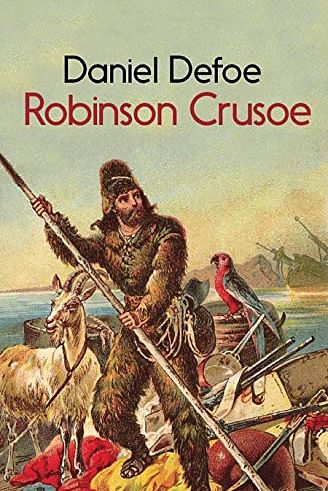
ROBINSON CRUSOE by Daniel Defoe
(1719)
Reviewed by Masooma Shabbar
Right now, in the midst of a pandemic when we have been mostly confined to our homes for almost two years, being stuck on a serene island seems like a dream to most of us. But Crusoe wasn't stranded on an exotic island in the Maldives. He was stranded on a remote island with no human dwelling, somewhere in an uncharted area of the Pacific.
The story is written in a narrative form where the protagonist leaves his comfortable life to seek a fortune at sea. He has several tragic experiences but that doesn't deter him from having more adventures. Unfortunately, in one such incident, he is caught by pirates and is sold into slavery. Even more unfortunately, the ship gets wrecked at sea and Crusoe is the only survivor. As the book proceeds, we go through an array of emotions as Crusoe depends on his strength and skills to persevere on the island.
When someone is stranded, all alone, and all odds are against him, two things can happen. Either you become an atheist, or you become religious. The latter happened with Crusoe. His journey becomes one of spirituality and he becomes a testament to the phrase, "necessity is the mother of all inventions". Crusoe takes the reader along on a journey of a myriad of emotions, of happiness and struggle, the elation of finding another human footprint in the sand and the horror and fear of finding out that there are cannibals living on the same island. You will feel his frustrations when his plans fail, his sheer joy at finding a friend in Friday. You feel all the emotions as your own.
At a time where we are all connected with each other at the touch of our fingertips, Robinson Crusoe makes for an even more interesting read because the experiences he has, we might never have.
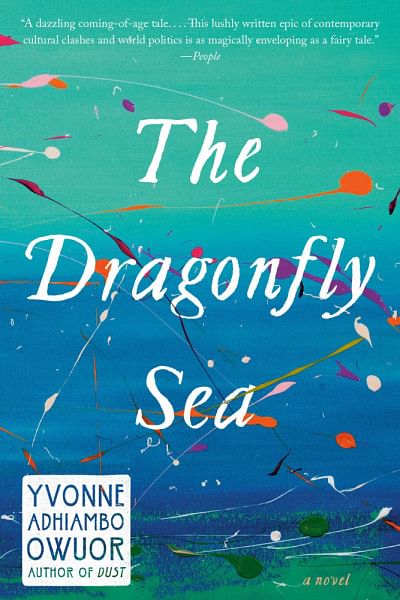
THE DRAGONFLY SEA by Yvonne Adhiambo Owuor
(Knopf, 2019)
Reviewed by Sarah Anjum Bari
The Dragonfly Sea takes us to Pate Island off the coast of Kenya, where young Ayaana lives and swims amidst the voices of the sea. The island's intimate community are unwelcoming of Ayaana and her defiant, solo-flying mother Munira; they judge the bond Ayaana has forged with Muhidin, the sailor she "chooses" as her father. These trials, the cruel tricks of fate, and the uncertain politics of early 21st century Kenya decide Ayaana's journey from Pate—an island invisible on the world map—to China, to Turkey, and back home.
Yvonne Adhiambo Owuor bases her book on the real life story of a Kenyan young woman who was chosen to travel to China for education and assimilation, on account of being a descendent of Chinese General Zheng He, whose crew had shipwrecked on the island in the 15th century. This was fascinating to me, but it was the sheer amount of intricate, heartfelt detail that Owuor adds to this premise that blew my mind. The prose is unlike anything I've read before—it braids in Farsi, Hindi, East African, Mandarin, and Turkish into English in a way that is respectful to all the languages, and it mirrors the fluid, life-heavy spirit of water bodies which casts its shadow across the entire novel. If Ayaana's love of Bollywood and East African culture, her dexterity with mathematics and nautical sciences, her relationship with Islam, and her taste for rose petals and historical maps cast a spell of magic, the constantly hovering threat of Islamic fundamentalism and the West's War on Terror ground the story in the very real, horrifying, complicated world.
I did think some of the scenes were over-dramatic and that the short dialogues made it hard to associate a different voice with each character. Nor did I love how all the male characters were tortured beings for whom Ayaana was meant to bring salvation. But despite being aware of these flaws, I was completely swept up in the rich, compellingly told story borne skillfully by its episodic scenes and a certain lightness of language.
Keep an eye on Bookcentric and Daily Star Books' social media pages for September's reaching challenge. For more book-related news and views, follow Daily Star Books on Facebook, Instagram, Twitter, and LinkedIn.

 For all latest news, follow The Daily Star's Google News channel.
For all latest news, follow The Daily Star's Google News channel. 


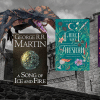





Comments